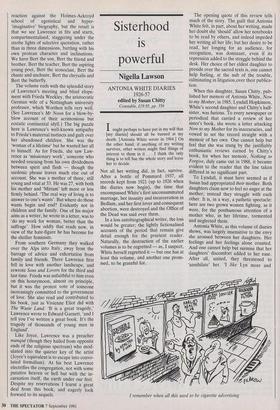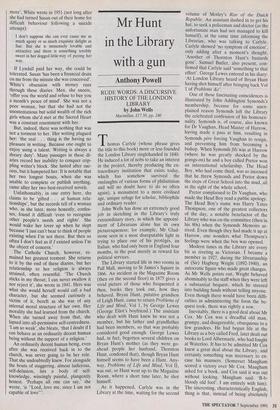Sisterhood is powerful
Nigella Lawson
ANTONIA WHITE DIARIES 1926-57 edited by Susan Chitty
Constable, £19.95, pp. 356
Iought perhaps to have put in my will that [my diaries] should all be burned at my death. [Antonia White wrote in 1964.] On the other hand, if anything of my writing survives, other writers might find things of interest to them in it . . . I think the only thing is to tell Sue the whole story and leave her to decide.
Not all her writing did, in fact, survive. After a bottle of Pommard 1937, all records kept from 1921 (up to 1926 when the diaries now begin), the time that encompassed White's first unconsummated marriage, her insanity and incarceration in Bedlam, and her first lover and consequent abortion, were destroyed and the Office of the Dead was said over them.
In a less autobiographical writer, the loss would be greater; the lightly fictionalised accounts of the period that remain give detail enough for the prurient reader. Naturally, the destruction of the earlier volumes is to be regretted — as, I suspect, White herself regretted it — but one has at least this volume, and another one prom- ised, to be grateful for. The opening quote of this review tells much of the story. The guilt that Antonia White felt, in part, about her writing, made her doubt she 'should' allow her notebooks to be read by others, and indeed impeded her writing all her life; but her desire to be read, her longing for an audience, for recognition, was dominant, even if its repression added to the struggle behind the desk. Her choice of her eldest daughter to preside over the sacred texts is, one cannot help feeling, at the nub of the trouble, culminating in litigation,over their publica- tion.
When this daughter, Susan Chitty, pub- lished her memoir of Antonia White, Now to my Mother, in 1985, Lyndall Hopkinson, White's second daughter and Chitty's half- sister, was furious. To every newspaper or periodical that carried a review of her sister's book, she wrote a letter attacking Now to my Mother for its inaccuracies, and vowed to set the record straight with a memoir of her own. One cannot help but feel that she was stung by the justifiably enthusiastic reviews earned by Chitty's book, for when her memoir, Nothing to Forgive, duly came out in 1988, it became evident to the reader that the line taken differed in no significant part.
To Lyndall, it must have seemed as if Susan had appropriated their mother. Both daughters claim now to feel no anger at the mother; instead they struggle with each other. It is, in a way, a pathetic spectacle: here are two grown women fighting, as it were, for the posthumous attention of a mother who, in her lifetime, tormented and neglected them.
Antonia White, as this volume of diaries shows, was largely insensitive to the envy she aroused between her daughters. Her feelings and her feelings alone counted. And one cannot help but surmise that her daughters' discomfort added to her ease. After all, united, they threatened to 'annihilate' her. 'I like Lyn more and I remember when all this used to be cigarette advertising more', White wrote in 1951 (not long after she had turned Susan out of their home for difficult behaviour following a suicide attempt):
I don't suppose she can ever cause me as much agony or as much exquisite delight as Sue. But she is immensely lovable and attractive and there is something terribly sweet in her dogged little way of paying her way.
If Lynda11 paid her way, she could be tolerated. Susan 'has been a financial drain on me from the minute she was conceived'. White's obsession with money runs through these diaries. Men, she sneers, 'offer you the world and refuse to buy you a month's peace of mind'. She was not a poor woman, but that she had not the unostentatious but solid wealth of the rich girls whom she'd met at the Sacred Heart was a constant resentment with her.
But, indeed, there was nothing that was not a torment to her. Her writing plagued her: 'the real . . . thing is the having no pleasure in writing. Because one ought to enjoy using a talent. Writing is always a dreary duty'. Many passages in these di- aries record her inability to conquer crip- pling writer's block. She lusted after suc- cess, but it hampered her. It is notable that her two longest bouts, when she was unable to complete or publish anything, came after her two best-received novels.
Unfathomably, in one entry here, she claims to be 'gifted . . . at human rela- tionships', but the records tell of a woman who, as she later, more honestly, confes- ses, found it difficult 'even to recognise other people's needs and rights'. She would wake her lover up when he slept because 'I just can't bear to think of people existing when I'm not there. But then so often I don't feel as if I existed unless I'm the object of concern.'
The Catholic Church, however, re- mained her greatest torment. She returns to it by the end of these diaries, but her relationship to her religion is always strained, often resentful. 'The Church sticks in my throat; I can never swallow it nor reject it', she wrote in 1941. Hers was what she would herself would call a bad character, but she seemed curiously a victim of it, bereft as she was of any internal moral structure of her own. Her morality she had learned from the church. When she turned away from that, she lapsed into all-permissive self-centredness. 'I am so weak', she bleats, 'that I doubt if I can behave as an ordinarily decent human being without the support of a religion.' An ordinarily decent human being, even after she was received back in to the church, was never going to be her role. That she undoubtedly knew. For alongside the bouts of staggering, almost ludicrous, self-delusion, lies a body of self- knowledge, wincingly painful, plangently honest. 'Perhaps all one can say,' she wrote, is "Lord, love me, since I am not capable of love".



















































 Previous page
Previous page